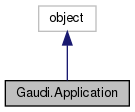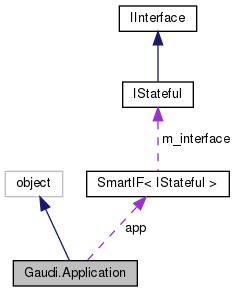 |
The Gaudi Framework
v32r2 (46d42edc)
|
 |
The Gaudi Framework
v32r2 (46d42edc)
|
Gaudi application entry point. More...
#include <Gaudi/Application.h>


Public Types | |
| using | Options = std::map< std::string, std::string > |
| using | Factory = Gaudi::PluginService::Factory< Application(Options)> |
Public Member Functions | |
| def | __init__ (self, opts, appType="Gaudi::Application") |
| def | create (cls, appType, opts) |
| def | run (self) |
| def | __del__ (self) |
| Application (Options opts) | |
| Construct and configure the application from the provided options. More... | |
| virtual | ~Application () |
| virtual int | run () |
| Implement the application main logic: More... | |
| int | run (std::function< int(SmartIF< IStateful > &)> action) |
| Run a user provided implementation of the application main logic. More... | |
Static Public Member Functions | |
| static Factory::ReturnType | create (std::string_view type, Options opts) |
| Factory function to instantiate a derived class via GaudiPluginService. More... | |
Protected Attributes | |
| SmartIF< IStateful > | app |
| Handle to the ApplicationMgr instance. More... | |
Private Attributes | |
| _impl | |
Gaudi application entry point.
Gaudi::Application can be used to bootstrap a standard Gaudi application or to implement custom applications, either via a specialization that overrides the method run (which can be instantiated either directly or via the GaudiPluginService, with the helper create) or by passing a callable object to the dedicated run method.
Definition at line 62 of file __init__.py.
| using Gaudi.Application::Factory = Gaudi::PluginService::Factory<Application( Options )> |
Definition at line 20 of file Application.h.
| using Gaudi.Application::Options = std::map<std::string, std::string> |
Definition at line 19 of file Application.h.
| def Gaudi.Application.__init__ | ( | self, | |
| opts, | |||
appType = "Gaudi::Application" |
|||
| ) |
Definition at line 63 of file __init__.py.
| def Gaudi.Application.__del__ | ( | self | ) |
Definition at line 92 of file __init__.py.
| Gaudi.Application::Application | ( | Options | opts | ) |
Construct and configure the application from the provided options.
Definition at line 41 of file Application.cpp.
|
virtual |
Definition at line 68 of file Application.cpp.
|
static |
Factory function to instantiate a derived class via GaudiPluginService.
Definition at line 36 of file Application.cpp.
| def Gaudi.Application.create | ( | cls, | |
| appType, | |||
| opts | |||
| ) |
Definition at line 86 of file __init__.py.
|
virtual |
Implement the application main logic:
Definition at line 70 of file Application.cpp.
|
inline |
Run a user provided implementation of the application main logic.
Definition at line 36 of file Application.h.
| def Gaudi.Application.run | ( | self | ) |
Definition at line 89 of file __init__.py.
|
private |
Definition at line 82 of file __init__.py.
Handle to the ApplicationMgr instance.
Definition at line 40 of file Application.h.